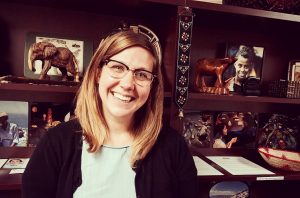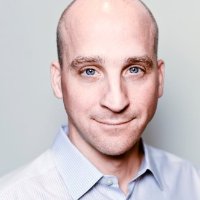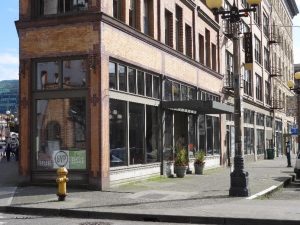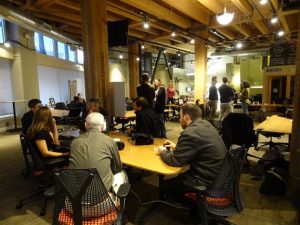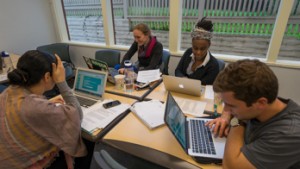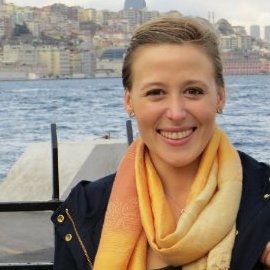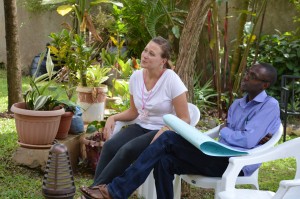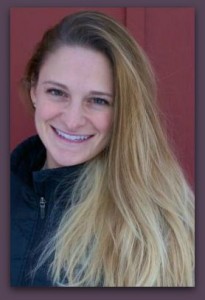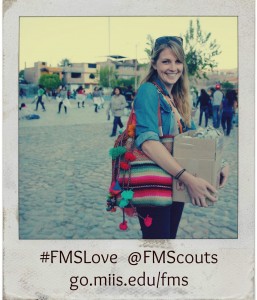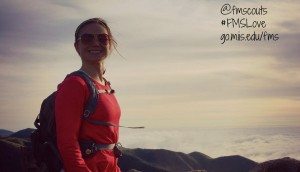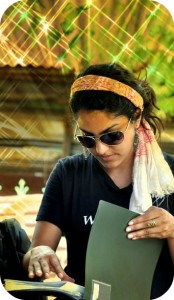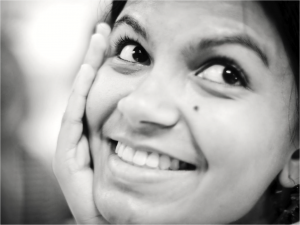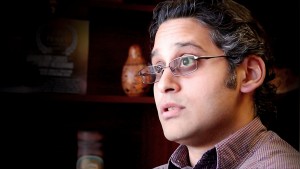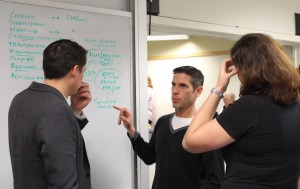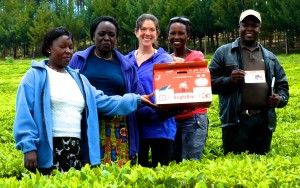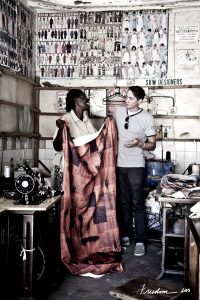 “We’ve found that market penetration and cultural understanding are the biggest challenges, because it can make or break the entire venture, no matter how business savvy the team is.”
“We’ve found that market penetration and cultural understanding are the biggest challenges, because it can make or break the entire venture, no matter how business savvy the team is.”
Hunter Sebresos (FMS ’15) is the Founder and Lead Designer of Concept Hunter, a growing consultancy focused on emerging market penetration. Hunter met his business partner Jeff Hicken while they were working in Kenya with MOTIIS, a market innovation team. Jeff is now Director of Business Development and Strategy at Concept Hunter. At MOTIIS, Hunter and Jeff researched markets and had the opportunity to participate in the creation of Bamba Water. Working in Kenya was the turning point for Hunter, where he was able to directly apply his traditional design education in the impact market. Right out of Kenya, he applied to FMS. Hunter and Jeff connect with us on their current work in the impact space-including a free e-book which teaches how to successfully penetrate a market by building an effective brand, marketing plan, and sales team. You can pre-order now for the June 2016 release.
Hunter, why did you decide to join FMS?
I wanted to legitimize my experience in Kenya and was attracted to the certificate because it focused on impact. I also wanted to make connections and meet others who were interested in the space and it was highly recommended by another member of the MOTIIS innovation team, Kevin Lehr, an FMS Alum. I knew that the training would give me a good overview of social enterprise and impact investing. Now, I feel like I can really speak to the two sectors whereas before, even though I was working in the space, I wasn’t as knowledgeable. Thanks to the FMS training, I am confident in my understanding of the key concepts in the social impact sector as well as the skills that I can contribute.
What was your biggest takeaway from FMS?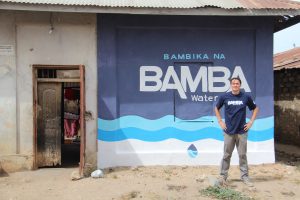
The due diligence training was extremely useful. Learning how a good investment deal is structured has informed many of my decisions since the training. Now, when we look at potential clients with Concept Hunter, we also go through aspects of the due diligence process. This helps us assess what stage the clients are in with their project and how we can best help them. It’s surprising how many companies turn a blind eye to this process and how useful it can be across the board.
What is Concept Hunter focusing on today?
After FMS, we connected about some of the challenges we see in the impact space. Through our experience working in Social Enterprise, we have observed that companies struggle with two debilitating problems in particular. The two problems are (1) attracting investment capital and (2) penetrating markets through effective branding, marketing, and sales. The investment capital problem is overwhelming, however, we believe we can help solve the market penetration problem for social ventures. Not only that, but we believe effective market penetration will help them attract investment capital. Think about it, we haven’t seen a Facebook or a Twitter in the Social Enterprise industry. Once we see one or two Facebook-like companies emerge from Social Enterprise, that is when we will also see serious investment capital flood for these ventures.
Today, Concept Hunter helps clients build a powerful brand, marketing plan, and sales team to penetrate emerging markets and generate high returns. We specifically focus on the following:
- How clients can find a brand that will be adopted and spread in the culture they are addressing.
- How to market in a way that will resonate with the local culture and communities.
- How to create sales teams that actually drive results, also paying attention to the local culture.
The one thing we find to be absolutely crucial to a venture’s success is to have an understanding of the local culture and to know which aspects are challenges and which are opportunities. We call these opportunities “anchors” and they allow for a solid foundation upon which the company can prosper. The reality is, when it comes to business, it is REALLY difficult to work upstream against culture. Culture must be taken into account and Concept Hunter works to identify ways that companies can incorporate cultural factors into their market penetration strategies to ensure greater success.
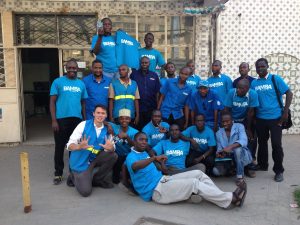 Even for teams who are already on the ground and who already have their services or products in use, crucial mistakes can be made when it comes to market penetration that will compromise the health of the venture. With help from MOTIIS, Bamba Water went from selling 3,000 units daily to now selling 90,000 units daily, and this in a matter of two years. They have also expanded to Nairobi and we know that increasing sales by 30x was only possible because of how seriously we paid attention to culture and the specific market. Using our experience with Bamba Water and our team’s success, we want to help other enterprises incorporate the benefits of truly understanding the market they are working in and applying that knowledge to branding, marketing and sales. Better yet, we know that if we can help ventures be more successful- such as increasing sales by 30x in two years- it will automatically address the first issue of finding funding because impact investors will undoubtedly be more attracted to these successes.
Even for teams who are already on the ground and who already have their services or products in use, crucial mistakes can be made when it comes to market penetration that will compromise the health of the venture. With help from MOTIIS, Bamba Water went from selling 3,000 units daily to now selling 90,000 units daily, and this in a matter of two years. They have also expanded to Nairobi and we know that increasing sales by 30x was only possible because of how seriously we paid attention to culture and the specific market. Using our experience with Bamba Water and our team’s success, we want to help other enterprises incorporate the benefits of truly understanding the market they are working in and applying that knowledge to branding, marketing and sales. Better yet, we know that if we can help ventures be more successful- such as increasing sales by 30x in two years- it will automatically address the first issue of finding funding because impact investors will undoubtedly be more attracted to these successes.
What are the key aspects of market penetration that your book will address?
We note that a sound market penetration strategy will cover the process, methods and expected outcomes for the following aspects of a venture:
– Cultural / Market Awareness
– Brand building
– Marketing strategy
– Sales Team building
These techniques are useful for both for-profit and nonprofit companies. In fact, we urge nonprofit companies to begin paying more attention to this topic and know that it can greatly benefit them. People tend to think that business principles won’t apply to nonprofits and that focusing on sales or branding isn’t where they should put efforts. We know, however, that by focusing on branding and marketing and localizing to specific markets can be immensely beneficial to their operations. The Red Cross does a great job of branding and marketing themselves in a way that is similar to for-profit models, and it works to their advantage. We encourage individuals working in the nonprofit space to read our book and to focus on market penetration techniques.
Will your book address market penetration in multiple regions?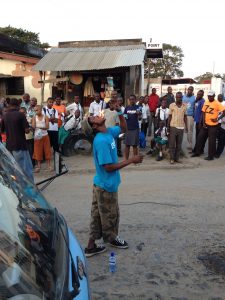
We will be using experiences from the multiple cultures we have worked in and we will also be using experiences from other individuals working in the impact space around the world. These stories will help give context to the key points we emphasize.
It is important to note that we find similarities in market penetration challenges to have more to do with an economic divide than a regional divide. We are writing the book specifically for people working in emerging markets and in fact would not suggest the same tactics to someone working in the U.S. or bigger markets. These tactics may work, but our advice is not tailored to large markets. Most of the book is coming from our experience in Kenya with Bamba Water, and we will be incorporating insight from others who have worked in different countries and with different ventures. While the inspiration for the book came from our experience in Kenya, the formula we have developed in the book is one that can be applied to any emerging market. When we think to our experiences in other countries such as Ecuador and the Philippines, we remain confident in our formula and are excited to share it with everyone in this book.
Are there any stories you can share with us now?
Hunter: One of my favorite stories is the experience I had creating Bamba Water’s tagline. First, I’ll note that Bamba Water sells water sachets and not water bottles. Water bottles were twice the price of what we were offering and well water was not a safe option for many people, so we had a great advantage. In the beginning, working with branding, we came up with “bottles are for babies”. As Americans, we loved the tagline, we felt it applied right away. However, I started to notice that Kenyans weren’t actually appreciating the tagline the way we did. It wasn’t funny the way it was to Americans because…Kenyan babies don’t drink from bottles. The tagline ended up only coming off as if we were making fun of individuals who drink bottled water. Fortunately, after noticing the reaction and before placing “bottles are for babies” on every poster, we came up with “Bambika na Bamba Water” which resonated much better with Kenyans. Not only did it make sense- translating to “refresh yourself with Bamba Water”- but it also had the alliteration and it rolled off the tongue in a way that felt good when saying it. The reaction we got from Kenyans to the new tagline was similar to what we were getting from Americans with “bottles are for babies”, and this solidified for us that it was a perfect fit. This experience proved how important it is for companies to pay attention to the market culture and customer preferences. If one were to travel to Mombasa today and ask ten people about Bamba Water, they will all respond with ‘Bambika”. That’s how well it works.
the way it was to Americans because…Kenyan babies don’t drink from bottles. The tagline ended up only coming off as if we were making fun of individuals who drink bottled water. Fortunately, after noticing the reaction and before placing “bottles are for babies” on every poster, we came up with “Bambika na Bamba Water” which resonated much better with Kenyans. Not only did it make sense- translating to “refresh yourself with Bamba Water”- but it also had the alliteration and it rolled off the tongue in a way that felt good when saying it. The reaction we got from Kenyans to the new tagline was similar to what we were getting from Americans with “bottles are for babies”, and this solidified for us that it was a perfect fit. This experience proved how important it is for companies to pay attention to the market culture and customer preferences. If one were to travel to Mombasa today and ask ten people about Bamba Water, they will all respond with ‘Bambika”. That’s how well it works.
Another quick example is our decision to put up a billboard at the entrance of the ferry between the island of Mombasa and the city of Likoni. Whereas in the U.S., this decision would have been for the purpose of marketing and awareness, in Kenya, it was for the purpose of gaining credibility. We knew the culture and the appreciation of status when a company obtains a large billboard, and therefore knew that it would be an advantage with customers to place that ad in such a prime location in a way that proved our status.
Jeff: On the sales side, everything has to sync with culture, just like on the brand side. With your sales team, you have to develop simple, consistent, repetitive standards. Sales culture—and company-wide culture for that matter—is not something that comes because you wrote it in a mission statement. Rather, culture comes from the accumulation of your standards exhibited through habits and behaviors over time. When we started with Bamba Water, the sales team wasn’t very developed. I spent the first weeks moving around with the sales team, learning how they worked and taking notes. I quickly realized they had many challenges and from there was able to identify the obstacles and opportunities. Some of the obstacles we found included opinions about positions and status. At Bamba Water, each team had a sales manager, a sales clerk in charge of inventory and a mkokoteni pusher- the individual who pushed the cart and delivered the product. In Kenya, a manager is generally seen to be sitting behind a desk and directing people on what to do, but not engaged much further. On the flip side, within the context of Kenya, pushing the cart as a mkokoteni pusher was one of the lowest positions and was the most labor-intensive job. There was one mkokoteni pusher in particular, Simon, who really caught my eye and who I often traveled with. One day we went to a school and I watched Simon work very hard and play with the kids while his manager would only sit on the truck and fill the role he felt he was meant to play. Shortly thereafter, the manager himself left and we put Simon in the manager role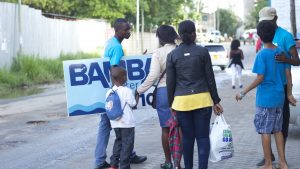 . This was a defining moment; it was amazing to see him going from what was seen as a bottom position to be working as manager and because he understood the cart pusher experience, he was right away an effective manager. For us, the single most important leadership training for the sales managers was to teach them ownership of their team’s results. They had a tendency early on to blame everything but themselves for poor performance, i.e. weather, their team, their superiors, the product, etc. We had no tolerance for this lack of ownership, and trained all sales managers to take full responsibility for the performance of their team. If their sales were down, it was the sales manager’s fault and no one else’s. This was something that Simon took very seriously, and did very well. This critically changed the way his sales team operated. Simon went on to lead the top-producing area in Kenya for Bamba Water and I’m so proud to have witnessed that progression.
. This was a defining moment; it was amazing to see him going from what was seen as a bottom position to be working as manager and because he understood the cart pusher experience, he was right away an effective manager. For us, the single most important leadership training for the sales managers was to teach them ownership of their team’s results. They had a tendency early on to blame everything but themselves for poor performance, i.e. weather, their team, their superiors, the product, etc. We had no tolerance for this lack of ownership, and trained all sales managers to take full responsibility for the performance of their team. If their sales were down, it was the sales manager’s fault and no one else’s. This was something that Simon took very seriously, and did very well. This critically changed the way his sales team operated. Simon went on to lead the top-producing area in Kenya for Bamba Water and I’m so proud to have witnessed that progression.
Where can we access the e-book once it is published?
The book will be available on our site and is projected for publication in June 2016. We encourage everyone to pre-order today. Our goal is to help social enterprises get over the common problem of market penetration issues and we believe all entrepreneurs should have access to this knowledge, which is why we are providing our book for FREE online.
Follow Concept Hunter: Twitter LinkedIn
Hunter Sebresos served in the Marine Corps out of high school and was deployed to multiple locations where he grew an appreciation for people and cultures. He spent two years on a religious mission in the Philippines and then worked in advertising in cities including New York, Salt Lake City and Miami. Hunter then became interested in other aspects of communication and design which led him to apply to graduate school in order to find ways of blending his love of international cultures and design. After graduate school, he worked at NASA and helped communicate the various complex activities of scientists and astronauts to the public. Shortly after NASA, he moved to Kenya and worked with MOTIIS before joining FMS.
Jeff Hicken lived in Ecuador for two years on a religious mission after high school. The experience marked him as it was his first time living outside of the United States. He then studied Economics at BYU in Utah and worked in business development. When he moved to Kenya to work with MOTIIS and Bamba Water, Jeff focused on innovative ways to develop the sales team. His background in economics and business compliments Hunter’s design background, which is a unique aspect of the Concept Hunter Team.
The Frontier Market Scouts (FMS) program seeks purpose-driven professionals to join its award-winning social enterprise management and impact investing certificate trainings in Monterey, California (June 6-17, 2016), and Washington, DC (Winter 2017). Founded in 2011, FMS has trained more than 300 professionals since its inception. FMS received a 2013 Cordes Innovation Award from AshokaU and has now become the flagship program of the newly launched Center for Social Impact Learning at the Middlebury Institute of International Studies at Monterey. The early application deadline is April 29, 2016. Learn more and submit your application here.


